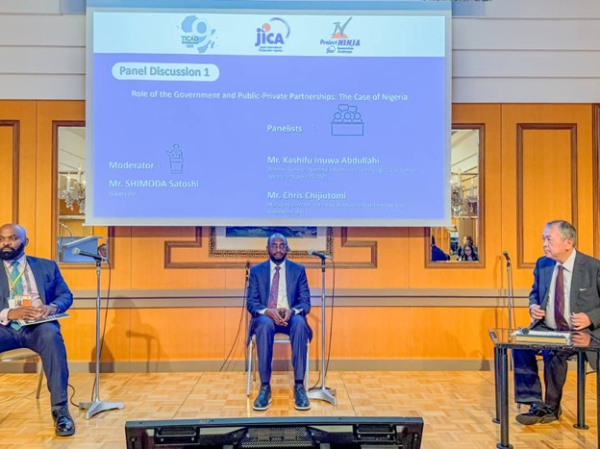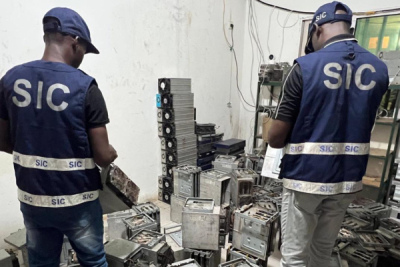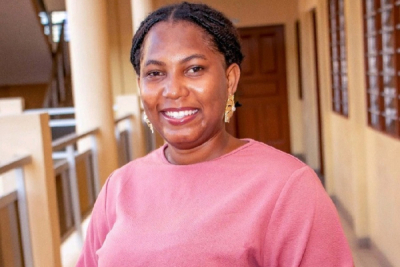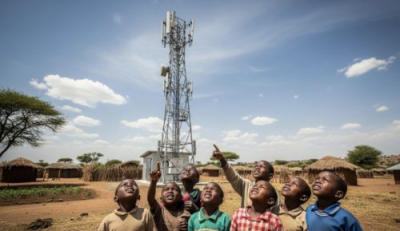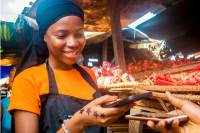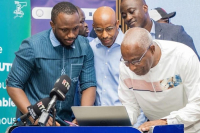As Nigeria advances its digital transformation, collaborations with global technology leaders like NEC are expected to play a crucial role in unlocking opportunities across various sectors, thereby fostering sustainable development.
The Director General of the National Information Technology Development Agency (NITDA), Kashifu Inuwa, has met with senior executives of NEC Corporation, one of Japan’s leading multinationals in artificial intelligence (AI), digital government, and sustainability solutions, to discuss accelerating the adoption of AI and strengthening Nigeria’s digital infrastructure.
The meeting, announced on August 23, brought together Yosuke Koide, Director of NEC West Africa; Carel Coetze, CEO of Miho Hara International Development Aid; and Kentaro Maekawa, Senior Relations Department of NEC. It focused on accelerating AI adoption across Nigeria’s key sectors. Priority areas include agriculture, digital infrastructure, smart governance, and sustainable technology solutions.
Agriculture remains the backbone of Nigeria’s economy, contributing 25% to GDP in Q4 2024 (Nigeria’s largest GDP contributor), according to the National Bureau of Statistics. Deploying AI solutions for precision agriculture, crop management, and market access could deliver transformative benefits for millions of Nigerians.
For citizens, the partnership promises practical benefits—from boosting food security through precision farming and data-driven crop management, to expanding access to digital services and enhancing public sector efficiency. AI-powered tools can help smallholder farmers to increase yields, reduce losses, and better manage climate risks. In governance, smart systems can improve transparency, streamline service delivery, and reduce corruption.
The NEC engagement also comes as Nigeria scales up its 3 Million Technical Talent (3MTT) program, designed to train young people in digital and AI-related skills. By linking Nigeria’s innovation ambitions with NEC’s global expertise in AI and digital governance, the country can ensure its workforce is prepared for emerging opportunities in AI-driven sectors.
Hikmatu Bilali
As the government pushes forward with its Digital Superhighway agenda, fibre connectivity is becoming a cornerstone for inclusive growth, innovation, and long-term development.
Kenya has extended its fibre optic network to Kericho and Bomet counties, in a move expected to accelerate access to education, healthcare, business opportunities, and government services. The rollout, announced August 23, forms part of the country’s Digital Superhighway agenda, which seeks to provide fast, reliable, and high-capacity internet across the nation, enabling more communities to benefit from the digital economy.
For Principal Secretary - State Department for ICT and Digital Economy, Eng. John Kipchumba Tanui, “Fibre infrastructure is a game changer for communities because it provides fast, reliable, and high-capacity internet connectivity that supports education, business, healthcare, government services, and innovation.”
In schools and institutions, the fibre backbone will support modern e-learning, while farmers and local businesses gain access to e-commerce platforms and digital financial services. Healthcare facilities will benefit from telemedicine and real-time information sharing, and government services will become more efficient and accessible online. The initiative is also expected to generate jobs in ICT, digital trade, and other emerging sectors.
The rollout forms part of Kenya’s Digital Superhighway Project (DSH). Launched in November 2023, the program seeks to deliver universal broadband by deploying 100,000 km of fibre, 25,000 public Wi-Fi hotspots, 1,450 digital hubs, and three national data centres, alongside enhanced data protection and cybersecurity systems.
According to an update from the ICT Authority of Kenya, Phase One of the project, funded with KSh 5 billion, has seen 88% of backbone fibre (1,512 km) and 77% of last-mile connections (312 of 405 sites) completed. Phase Two, backed by KSh 10 billion, is being implemented in partnership with the Kenya Power and Lighting Company (KPLC) to extend last-mile connectivity to about 8,000 sites nationwide, including schools, universities, health centres, digital hubs, and Wi-Fi locations. Early works cover 3,868 sites and 278 Deputy County Commissioner offices, accelerating efforts to bridge the country’s urban–rural digital divide.
So far, 135 institutions across Kericho and Bomet have been connected. An additional 275 sites are set to come online in 2025, further strengthening the digital backbone in the two counties and enabling more households, schools, and businesses to fully take part in Kenya’s digital transformation.
Hikmatu Bilali
-
Interpol operation recovered $97.4M, found 88,000 victims
-
1,209 arrests, 11,432 cybercrime networks dismantled across Africa
-
Major scams uncovered in Angola, Zambia, and Ivory Coast
Interpol announced on Friday, August 22, that a massive anti-cybercrime operation across 18 African countries led to the recovery of $97.4 million and the identification of nearly 88,000 victims.
Codenamed "Serengeti 2.0," the operation, which ran from June to August 2025, also resulted in the dismantling of 11,432 criminal infrastructures and 1,209 arrests.
"Each INTERPOL-coordinated operation builds on the last, deepening cooperation, increasing information sharing and developing investigative skills across member countries. With more contributions and shared expertise, the results keep growing in scale and impact. This global network is stronger than ever, delivering real outcomes and safeguarding victims," said Valdecy Urquiza, the organization’s Secretary General.
Major Scams Exposed
In Angola, authorities discovered 25 illegal cryptocurrency mining farms, operated by 60 Chinese nationals and powered by 45 clandestine mini-power plants. The operation caused an estimated $37 million in damages. The seized equipment will be repurposed to improve electricity access in vulnerable areas.
In Zambia, investigators uncovered a massive online investment scam that affected nearly 65,000 victims and generated an estimated $300 million in losses. Fifteen suspects were arrested, and digital evidence was seized. Investigations are ongoing to trace financial flows and dismantle any international ramifications of the network.
In Ivory Coast, a transnational inheritance scam operating from Germany was neutralized. The main suspect was arrested, and valuables including jewelry, vehicles, and cash worth an estimated $1.6 million were seized.
Regional Cooperation and International Support
Supported by the United Kingdom as part of the African Joint Operations against Cybercrime (AFJOC), the initiative involved private sector experts in cryptocurrency tracing, ransomware analysis, and open-source intelligence. Interpol also collaborated with the International Cyber Offender Prevention Network (InterCOP), a consortium of 36 countries tasked with anticipating and neutralizing digital threats before they materialize.
The operation comes just a few months after "Operation Red Card," which led to the arrest of 306 people and the seizure of nearly 2,000 electronic devices in seven African countries: South Africa, Ivory Coast, Ghana, Kenya, Nigeria, Tanzania, and Uganda.
Cybercrime is a critical issue for African economies, which are already weakened by unevenly developed digital infrastructures. According to the African Union, it costs the continent nearly $4 billion each year. A Cybersecurity Ventures study estimates that the rise of artificial intelligence will further exacerbate the situation, with global losses expected to increase by 11% to $10.5 billion in 2025.
Samira Njoya
-
Founder of Ivoir’OpsTech, a start-up launched in 2022 to digitalize operations
-
Company offers platforms for mail, ticketing, and baggage management
-
Ziago built expertise through roles in fintech and logistics before founding his firm
Marcelin Zouzou Ziago, an Ivorian telecommunications engineer, is the founder and CEO of Ivoir’OpsTech, a start-up focused on helping businesses transition to digital operations.
Founded in 2022, Ivoir’OpsTech specializes in operational management and IT services tailored to the African market. The company offers a range of products, including advanced digital platforms adapted to different sectors.
Among its flagship solutions is KOTscan Courrier, a digital platform available on web and Android that can run offline, allowing full management of business mail. Another product, KOTscan Ticket, supports transport companies in managing ticketing while tracking revenues. The firm has also developed KOTscan Bagages, a tool that streamlines baggage and freight handling services.
Ziago graduated in 2007 with a Higher Technician Certificate in Telecommunications from the Institut Supérieur de Formation Professionnelle in Côte d’Ivoire. In 2012, he obtained a degree in Networks and Telecommunications from the Institut des Technologies d’Abidjan.
His career began in 2014 at BeFree Corporation, a financial services provider, as a sales technician. In 2017, he joined DigiTinnov, a digital solutions start-up, as a business developer. In 2018, he moved to KeyOpsTech, a parcel delivery company, where he became operations director in Côte d’Ivoire before rising to West Africa operations director from 2020 to 2022.
Melchior Koba
She's using technology to transform Togo's food sector, driving more inclusive development. Her entrepreneurial work aims to modernize restaurant operations and simplify the agricultural supply chain for a sustainable future.
Togolese entrepreneur Edourda Adade is co-founder and CEO of Ndupe, a startup specializing in technology solutions for Africa's food sector.
Founded in 2024, Ndupe aims to modernize the agricultural value chain and promote a sustainable food system in Togo. The company provides a platform that helps restaurants grow their online presence by facilitating the creation of digital storefronts and simplifying order and delivery management.
Ndupe also offers an online marketplace that directly connects producers with buyers. The company supplies restaurants with ingredients, packaging, and utensils. Its platform allows users to track their performance in real time, analyze trends, and make informed decisions. Through the Ndupe Academy, the company provides training and personalized support to help restaurants digitize operations and optimize their use of the platform's tools.
In addition to her role at Ndupe, Adade has hosted the weekly "Tech Talk" program on La Famille du Togo radio since May 2025. The show features experts, content creators, engineers, and entrepreneurs who discuss digital and innovation issues, sharing their experiences and highlighting opportunities in new technologies.
A graduate of the Lomé Polytechnic School with a bachelor's degree in science and technology, Adade began her career in 2023 as a web development intern at Technology & Business and Opticodev in Togo. In 2024, she joined NS Global Expertise as a technical sales manager, where she helped develop technology solutions tailored to business needs.
Melchior Koba
The procurement marks a pivotal step in Kenya’s digital journey, translating policy commitments into tangible impact for rural communities. By extending broadband to schools, health centres, and government offices, the project also advances the country’s National Digital Masterplan.
The Government of Kenya, through the Information and Communications Technology Authority (ICTA), has invited bids for the provision of broadband internet under the Kenya Digital Economy Acceleration Project (KDEAP). The bids are to be submitted on or before 1st October 2025 at 10:00 AM EAT.
The initiative will deliver broadband capacity to selected schools, health centres, and administrative offices in underserved areas, helping to close Kenya’s digital divide and strengthen public service delivery.
According to ICTA, the agreement will prioritize rural communities, where limited connectivity has long hindered access to education, healthcare, and digital services. By connecting government institutions in these regions, the project is expected to enhance e-learning platforms, support digital health services, improve agricultural extension programmes, and boost citizen access to essential e-government services.
Launched in 2023 with a US$390 million facility from the World Bank, KDEAP is the backbone of Kenya’s digital transformation agenda. Implemented by the ICT Authority under the Ministry of Information, Communications, and Digital Economy, the five-year programme aims to expand high-speed internet access to schools, hospitals, government offices, and marketplaces, while digitizing public services and enhancing citizens’ digital skills.
Structured in two phases (2023–2028 and 2026–2030), KDEAP focuses on three pillars: expanding broadband infrastructure to rural and underserved areas, modernizing government platforms for faster and more secure service delivery, and scaling up digital skills for youth, women, and persons with disabilities. It also aims to mobilize private sector investment in broadband expansion, aligning with Kenya’s National Digital Masterplan, which envisions 100,000 km of fiber coverage and 80% of public services digitized by 2030.
The procurement process will adhere to international competitive bidding rules, guided by World Bank standards, to ensure transparency, efficiency, and a timely rollout to rural areas.
If successful, the rural broadband rollout will help position Kenya as a regional digital leader, while ensuring that no community is left behind in the shift to a knowledge-based economy.
Hikmatu Bilali
A trained occupational therapist, Meg Faure has built a career that combines clinical practice with entrepreneurship. Her initiatives sit at the intersection of child health and digital solutions for parents.
A South African entrepreneur and occupational therapist, Meg Faure has built a career at the intersection of child health and digital solutions for parents. With more than two decades of experience in the field, she is the director of Parent Sense, an application she launched to guide parents through the first months of a child’s life.
Created in 2020, Parent Sense is based on clinical data and research. The app provides individualized tracking for several aspects of a baby’s development, including sleep, feeding, motor skills, and cognitive abilities. Its recommendations are adapted to each child’s evolution with flexible routines that account for a family’s pace. The app also includes interactive tools to monitor key health parameters, aiming to give parents concrete guidance to organize daily life and reduce the uncertainties of early parenthood.
Parent Sense is the latest in a series of ventures for Faure. She is also the director of Play Sense, which she founded in 2016 to develop play-based educational programs for children ages two to five. Before that, she created Baby Sense in 2004, a company specializing in products and services for new parents that she led until 2014.
Faure graduated from the University of Cape Town in 1993 with a bachelor's degree in occupational therapy. Her professional career began in 1994, working as an occupational therapist at both Blythedale Children’s Hospital and Kerry L. Wallace, a medical practice in South Africa.
Melchior Koba
While millions of Africans have embraced mobile money for savings, its adoption for credit remains modest. This is primarily due to the persistence of informal lending practices, even as new innovations begin to emerge.
Mobile money has become a transformative force for financial inclusion in Africa, yet its full potential remains untapped. While the service has excelled at providing a platform for savings, it has made little headway in providing widespread access to credit. The Global Findex Database 2025, published by the World Bank, shows the share of African adults with a mobile money account soared from 27% to 40% in just three years, reaching the highest rate globally. The report found that 23% of African adults saved using their mobile accounts in 2024, nearly double the rate of 13% in 2021.
The report also shows that 35% of African adults overall reported saving digitally or through traditional institutions. In countries with large mobile money economies like Ghana, Kenya, Senegal, and Uganda, more than 50% of adults use mobile money for savings, signaling a massive adoption of the service.
Mobile money is more accessible than traditional banking networks, making it easier to save small amounts and providing flexible deposits and withdrawals through local agents. This has led to more inclusive adoption, especially in rural and informal settings.
Savings Succeed, Credit Stalls
Despite the success of savings, access to credit through mobile money remains very limited. In 2024, only 7% of African adults borrowed through their mobile accounts, a figure that has remained stable since 2021. By contrast, nearly 59% of adults across the continent used some form of credit, though primarily through informal means like family or savings clubs.
In major mobile money markets like Kenya, Ghana, and Uganda, 22% to 32% of adults have borrowed through a mobile operator. However, these loans are typically small, short-term, and often carry high interest rates, which limits their overall economic impact.
Several factors explain this disconnect. According to the World Bank, regulatory authorities remain cautious, fearing over-indebtedness or fraud. The organization also points to business models that favor less-risky deposits and payments over credit.
The report also reveals that customers themselves are hesitant to borrow through platforms not well known for lending due to distrust, limited financial literacy, or overly strict eligibility simulators.
Innovations and Lingering Limits
While some specialized fintech and mobile platforms are gradually expanding their offerings through alternative credit scoring and nano-loans for micro-entrepreneurs, a mass-market for inclusive digital credit has yet to emerge. The report notes that countries with close cooperation among mobile operators, banks, and regulators, such as Kenya, are making progress, but elsewhere, advancement is slow.
The challenge now is to pair access to digital savings with policies for financial literacy, consumer protection, and regulatory innovation. The goal is to advance credit access without making already vulnerable populations more fragile.
For the World Bank, mobile money's full potential in Africa will only be unlocked when it contributes as much to productive investment as it does to savings security. This requires building customer trust and analytical skills regarding digital credit offers, improving interoperability between services and institutions, and adapting credit to local economic realities while minimizing associated risks.
Melchior Koba
His career, which has unfolded between Cameroon and France, seamlessly blends computer science with immersive technologies. He now develops projects that connect training, innovation, and entrepreneurship.
Cameroonian entrepreneur and developer Charles Bihina specializes in virtual and augmented reality. In 2022, he founded DiVRsitee, a company dedicated to designing educational games that raise awareness about different forms of discrimination.
DiVRsitee creates immersive experiences to address issues like gender discrimination, migration, harassment, and violence. The games place participants in the roles of vulnerable people who are often stigmatized, serving as a pedagogical tool and a vehicle for empathy. The company offers its solutions to businesses, associations, local governments, and institutions that want to organize immersive training and awareness workshops.
Bihina's work also extends to teaching and freelance development. He teaches programming and virtual reality on the Udemy platform and works as a trainer in VR, AR, the metaverse, and artificial intelligence at École Hexagone in France. He also operates as a freelance developer in extended reality (XR) on the Malt platform.
His academic journey began at the African Institute of Computer Science, where he earned a bachelor's degree in software engineering in 2012. He later received a master's in computer engineering from the Protestant University of Central Africa before continuing his education in France. In 2017, he obtained a master's degree in virtual engineering and innovation from Arts et Métiers ParisTech.
Bihina’s career started in 2011 as an IT specialist at Eneo Cameroon, the public electricity distributor. He then worked for the telecom operator Camtel and a dental practice before becoming the IT manager at Les Coccinelles international school in 2015. In 2019, he moved to France to work for EDF as a 3D graphic designer and VR application developer. From 2023 to 2024, he was a metaverse and artificial intelligence trainer at the French computer engineering school EPSI.
Melchior Koba
• Guinea launches platform for public access to draft constitution
• Citizens can ask legal experts questions via the site
• Platform supports local languages to boost participation rates
In a push to engage citizens ahead of a constitutional referendum scheduled for September 21, Guinea has launched a new digital platform, "maconstitution.info". The online tool gives the public easy access to the full draft of the new constitution, allowing them to understand its key issues and submit questions directly to legal experts. This initiative is a key part of the country's strategy to broaden citizen participation despite limited internet penetration in many rural areas.
The project, a joint effort by the Government's Secretariat General, the Ministry of Posts, Telecommunications, and Digital Economy, and the Ministry of Higher Education, Scientific Research, and Innovation, is part of a broader digital inclusion strategy.
"We are crossing a threshold: marrying technology with democratic values to give every Guinean clear and direct access to the draft of the new constitution. This platform stems from our commitment to comply with Article 18 of Law L/012 of April 25, 2025. It provides everyone with a simple and transparent tool," said Tamba Benoît Kamano, Minister Secretary General of the Government.
The platform offers full access to the constitutional draft and an interactive space for users to ask questions. These questions are handled by legal experts from the Secretariat General, with a commitment to respond within 48 hours.
To ensure the widest possible participation, the platform's content is available in several national languages, which helps reach citizens who do not speak French and reduces linguistic barriers to accessing information. If successful, this approach could become a model for other public consultation processes in Guinea or inspire similar initiatives in the sub-region.
According to DataReportal, Guinea had about 3.96 million internet users at the beginning of 2025, a penetration rate of 26.5%. While this figure is growing, it highlights the challenges of equitable digital access, particularly in rural areas. It is in this context that "maconstitution.info" stands as an innovation aimed at broadening citizen participation, despite current infrastructure and connectivity limitations.
Adoni Conrad Quenum
More...
Partnering with the ILO brings international expertise and credibility to Rwanda’s digital skills drive. It ensures that Rwanda’s training aligns with global labor standards while opening doors to wider support and partnerships.
On August 19, the Ministry of ICT and Innovation (MINICT) signed a Memorandum of Understanding (MoU) with the International Labour Organization (ILO) to strengthen collaboration on digital skilling and SME digitization through the One Million Rwandan Coders (1MRC) initiative.
“At the heart of this partnership is a shared goal: empowering more women and girls to take up space in Rwanda’s growing ICT sector,” the ministry said, reaffirming MINICT’s mission to leverage ICT for inclusive social development, accessible education, and accelerated job creation.
The agreement, signed by Permanent Secretary Yves Iradukunda and ILO representatives, aims to expand opportunities in Rwanda’s rapidly growing ICT sector. At the core of the partnership is a commitment to equip more Rwandans—especially young women and individuals with disabilities—with the digital skills necessary to thrive in today’s economy, while supporting small and medium-sized enterprises in adopting technology.
Launched as part of Rwanda’s broader digital transformation agenda, the 1MRC programme aims to equip Rwandans with digital skills, create jobs, and build a strong pipeline of local digital talent to drive the country’s knowledge-based economy. By integrating ILO’s expertise, the initiative will further enhance training quality, with a focus on preparing women and girls to participate meaningfully in the digital economy.
Although Rwanda’s ICT sector is growing rapidly, its impact on employment is still limited. According to Rwanda’s ICT Skills Snapshot 2022, ICT workers accounted for only 0.2–0.5% of total employment between 2018 and 2022, underscoring the need for stronger investment in digital skills and workforce development. The partnership between Rwanda and the ILO through the 1 Million Rwandan Coders initiative is therefore crucial—not only to bridge the gender gap in technology but also to expand the sector’s contribution to jobs, inclusivity, and national growth.
This latest MoU builds on an ongoing collaboration between Rwanda and the ILO focused on youth employment and digital skills development. In April 2024, the ILO launched the Boosting Decent Jobs and Enhancing Skills for Youth in Rwanda’s Digital Economy project, backed by the Government of Luxembourg, with a €4 million budget running through 2028. The initiative targets youth across Kigali and secondary cities, emphasizing digital skills, entrepreneurship, and pathways to decent work within the digital economy
The initiative builds on Rwanda’s digital transformation agenda, which seeks to position the country as a regional technology hub while ensuring no one is left behind in the digital economy.
Hikmatu Bilali
The serial entrepreneur has founded several companies in Kenya, spanning digital services, cosmetic distribution, and skincare technology.
Kenyan entrepreneur Maxine Kinyua is the founder and CEO of Tui Beauty, an AI-powered skincare technology platform specializing in skin analysis.
Founded in 2024, Tui Beauty aims to provide each user with a precise virtual skin diagnosis and personalized product and routine recommendations tailored to diverse African skin needs and types. The technology, accessible via smartphone, is based on an automated visual analysis.
After the AI performs a visual skin assessment, Tui Beauty suggests customized solutions to improve skin health and guides the user in purchasing authentic and reliable products. The service also integrates an e-commerce experience, allowing customers to easily order recommended products and receive information on their optimal use.
In addition to Tui Beauty, Kinyua is a strategic advisor at TreatMePal, a platform for beauty and wellness service companies. Before launching Tui Beauty, she founded Raize Digital Ke in 2016, a company focused on providing digital support to small and medium-sized enterprises (SMEs). In 2017, she founded EmkayStore Cosmetics, dedicated to distributing beauty products.
Kinyua holds a bachelor's degree in public relations, advertising, and applied communication from Maasai Mara University in Kenya, which she earned in 2019. She also holds a master’s degree in business administration from the University of East London in the United Kingdom.
Melchior Koba
• EXIM approves $47M for Côte d’Ivoire digitization project
• U.S. firms, including AWS and Cisco, to implement system
• Project counters China, supports 100 U.S. jobs via CTEP
The Export-Import Bank of the United States (EXIM) board of directors approved on Friday a $47 million financing package for the digitization of Côte d’Ivoire’s Ministry of Commerce and Industry. The project will be implemented by the Washington-based Cybastion Institute of Technology in partnership with technology giants such as Cisco, Amazon Web Services (AWS), Motorola Solutions, and Microsoft.
"Supporting the digitization of Côte d'Ivoire’s Ministry of Finance reinforces EXIM’s commitment to countering the rise of People’s Republic of China (PRC)’s influence. By approving today’s transaction, we are supporting around 100 jobs and countering the PRC by fortifying and securing our supply chains," said James Cruse, EXIM's acting chairman.
The initiative is part of the China and Transformational Exports Program (CTEP), a program launched by EXIM to support strategic U.S. technology exports, particularly in the face of Chinese competition. For Ivory Coast, this project supports its ambition to digitally modernize its administration.
The project, which is about to begin, aims to modernize the ministry's information systems, strengthen cybersecurity, integrate cloud solutions, and improve administrative efficiency. The goal is to enhance the transparency and responsiveness of public services, streamline procedures for businesses, and increase the country's attractiveness to investors. It also represents a significant step toward establishing a more competitive industrial and commercial environment that is better aligned with international standards.
Samira Njoya
Nigeria’s selection as the first beneficiary reflects its potential as a digital trade hub and its readiness to harness the power of women entrepreneurs in shaping the future of its economy.
Nigeria has become the first pilot country for the World Trade Organisation’s $50 million Women Exporters in Digital Economy (WEIDE) Fund, an initiative to help women entrepreneurs tap into the global digital marketplace. Rolled out on Thursday, August 14, in Abuja, the program aims to dismantle long-standing barriers that have held back women-led businesses from limited access to finance to weak digital infrastructure.
At the launch, Nigeria’s First Lady, Senator Oluremi Tinubu, hailed the initiative as a landmark step toward inclusive global trade, allowing Nigerian women entrepreneurs to scale their innovations and compete beyond national borders.
For WTO Director-General Ngozi Okonjo-Iweala, "The goal of the fund is to give women the tools, the knowledge, the networks, and the resources they need to access global value chains, so their businesses are not just surviving, but thriving, on the world stage."
Launched in February 2024, the WEIDE Fund is backed by the FIFA World Cup 2022 Legacy Fund, along with the Governments of Bahrain and the UAE. It represents a rare blend of international finance and trade policy dedicated specifically to women. The initiative is designed to empower women entrepreneurs by helping them expand their businesses through digitalization and international trade, targeting women-led MSMEs that are either already exporting, ready to begin exporting, or have strong export potential.
Under the first phase, 146 Nigerian women entrepreneurs will benefit. Sixteen “booster track” participants will receive $30,000 each alongside 18 months of technical support, while 130 others will receive $5,000 and a year of business mentorship. Beyond funding, the WEIDE Fund will equip beneficiaries with tools to enhance competitiveness, strengthen their digital capabilities, and expand their access to global markets.
Out of every 100 businesses in Nigeria, 39 are female-owned, according to World Bank data. Yet most remain small and excluded from global value chains due to financing and infrastructure gaps. If these women-led businesses were given adequate financing and access to digital/global markets, they could significantly boost Nigeria’s GDP, job creation, and trade competitiveness.
This highlights why the WTO’s $50m WEIDE Fund matters: it’s designed not just to acknowledge women’s participation, but to move them from small-scale survival businesses into globally competitive enterprises.
Hikmatu Bilali


